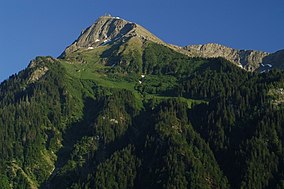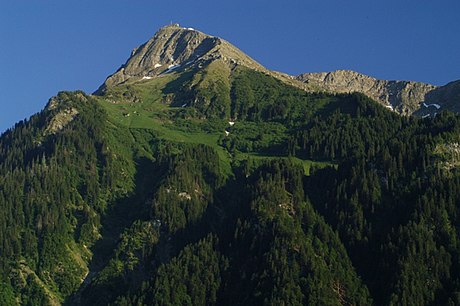The Niesen is a mountain peak of the Bernese Alps in the Canton of Bern, Switzerland. The summit of the mountain is 2,362 metres (7,749 ft) in elevation.
| Niesen | |
|---|---|
 The Niesen from Wimmis | |
| Highest point | |
| Elevation | 2,362 m (7,749 ft) |
| Prominence | 407 m (1,335 ft)[1] |
| Parent peak | Albristhorn |
| Isolation | 2.3 km (1.4 mi)[2] |
| Coordinates | 46°38′46″N 7°39′09″E |
| Geography | |
| Location | Canton of Bern, Switzerland |
| Parent range | Bernese Alps |
| Climbing | |
| Easiest route | Niesenbahn |
It overlooks Lake Thun, in the Bernese Oberland region, and forms the northern end of a ridge that stretches north from the Albristhorn and Mannliflue, separating the Simmental and Kandertal valleys.[3]
Geography
Administratively, the summit is shared between the municipalities of Reichenbach im Kandertal to the southeast, and Wimmis to the west and north. Both municipalities are in the canton of Bern.[3]
The summit can be reached easily by using the Niesenbahn funicular from Mülenen (near Reichenbach). The construction of the funicular was completed in 1910.
Alongside the funicular is the longest stairway in the world, with 11,674 steps. It is only open to the public once a year for a stair run event.[3][4][5]
Originally the mountains name was Yesen. «An Yesen» transformed to Niesen. Yesen is yellow gentian and still flowers on the Niesen to this day. [6] Because of its shape, the Niesen is often called the Swiss Pyramid.[citation needed] The Niesen may have influenced some modernist paintings by Paul Klee, in which an abstracted pyramidal form is seen.[7]
See also
References
External links
Gallery
Wikiwand in your browser!
Seamless Wikipedia browsing. On steroids.
Every time you click a link to Wikipedia, Wiktionary or Wikiquote in your browser's search results, it will show the modern Wikiwand interface.
Wikiwand extension is a five stars, simple, with minimum permission required to keep your browsing private, safe and transparent.





